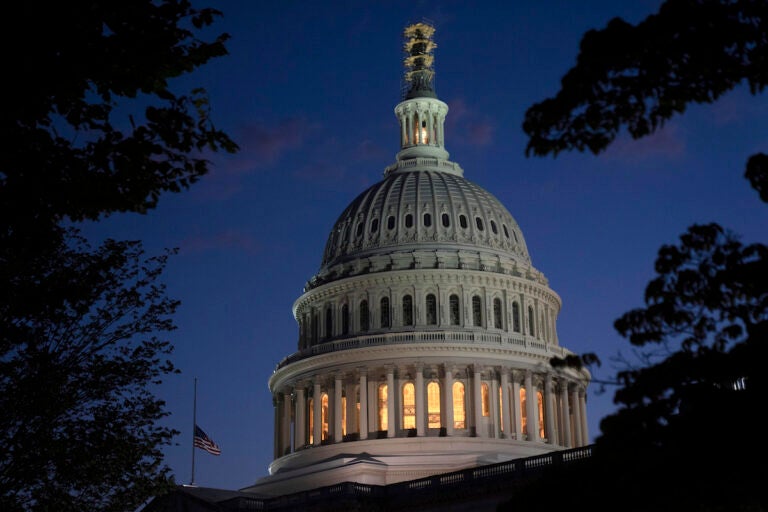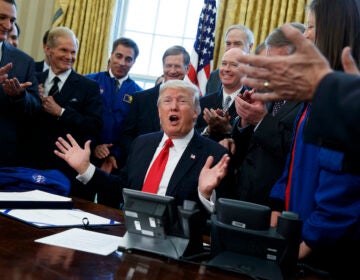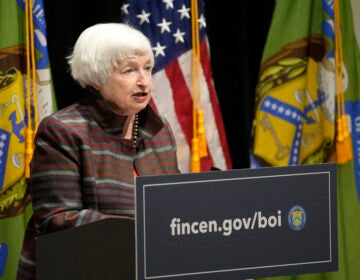House conservatives reject bipartisan spending agreement over demands for further cuts

Night falls on the dome of the Capitol in Washington. (AP Photo/Mark Schiefelbein)
Congressional leaders have reached a bipartisan spending plan that would avert a January 19 partial government shutdown, but many House Republicans say the deal does not go far enough to cut spending.
GOP Congressman Tim Burchett of Tennessee told Morning Edition that the deal won’t get his vote but stopped short of saying House Speaker Mike Johnson, R-La., should lose his job over the agreement.
“I don’t care if you’re a liberal, conservative, moderate or a mugwump, those numbers don’t add up,” Burchett told NPR’s Steve Inskeep.
Without support from the most conservative members of his party, Johnson will have to rely heavily on Democratic support to avert a government shutdown. That could threaten Johnson’s plan to add conservative policy provisions to the bill, like restrictions on abortion rights.
The agreement sets spending levels for the fiscal year with $886 billion for defense programs and roughly $773 billion for non-defense domestic programs for a total of about $1.6 trillion in overall spending. The agreement is virtually the same as a deal struck by Johnson’s predecessor House Speaker, Kevin Mcarthy and President Biden during last year’s debt limit negotiations.
NPR’S Deidre Walsh told All Things Considered that conservatives like Burchett were unlikely to vote for any spending agreement that could win support in the Democratically controlled Senate.
“A lot of people who are complaining now are conservatives who tend to vote against any deal that’s cut with any Democrats,” Walsh said.
That means Johnson will have to rely on votes from a majority of Democrats in order to pass the spending bills, a move that is sure to further anger the same conservatives who ousted McCarthy from his job over a similar decision.
Congress has to pass a total of 12 federal spending bills each year. So far none of the twelve bills have become law. Last year, Congress agreed to set a two-tiered deadline that divides those bills over separate deadlines. Lawmakers must pass the first portion of these bills by January 19th to avoid a partial government shutdown and pass the remaining bills Friday, Feb. 2.
“They’ve agreed on the size of the house, now they just have to come up with the blueprints and build the thing, “ NPR’s Eric McDaniel told Morning Edition on Monday.
Burchett conceded that despite his opposition, the spending bill will likely pass with the support of Democrats. Senator Chuck Shcumer has already signed onto the bill, and Senator McConell said he was “encouraged” by the deal.
“America faces serious national security challenges, and Congress must act quickly to deliver the full-year resources this moment requires,” he said on X, the platform formerly known as Twitter.
Other Republicans, however, called the bill a “total failure”
“Our nation simply cannot afford the Swamp’s reckless spending habits,” Georgia Representative Andrew Clyde tweeted on Monday.
Congressman Burchett said Johnson seems to have abandoned his promise to cut spending by agreeing to this framework
“It seems that once you get in this office, your viewpoints change,” Burchett said.
While he is planning to personally oppose the bill , Burchett said that Speaker Johnson continues to have the support of the GOP rank and file because the process in which this bill has been negotiated has been more open.
“At least this time, we’re going to know what we’re going to consume – it wasn’t force fed to us,” Burchett said.
Burchett said he is concerned that the United States is taking in more debt than it can handle, especially if Congress continues to increase aid to Ukraine. The bill sets topline spending levels at $886 billion for defense spending, but how much money is sent to Ukraine is still up in the air.
“That’s not America’s war,” Burchett said. “We’re slipping into another Vietnam type situation, where we first gave them money, then arms, then we gave them advisors, and then they gave us body bags.”
Burchett also rejected the idea that not supporting the Russia-Ukraine war will lead to the United States losing their international influence, saying that the United States has spent enough money and sent enough weapons to the area to show their support.
“We’ve already put in $114 billion dollars,” Burchett said. “And I would argue that 114 billion back home could be spent a whole better.”
Burchett said that the only way to avoid taking on more debt is to go back to pre-COVID spending levels.
“There is no plan, and no party has the guts to make the cuts,” Burchett said.
9(MDAzMzI1ODY3MDEyMzkzOTE3NjIxNDg3MQ001))




